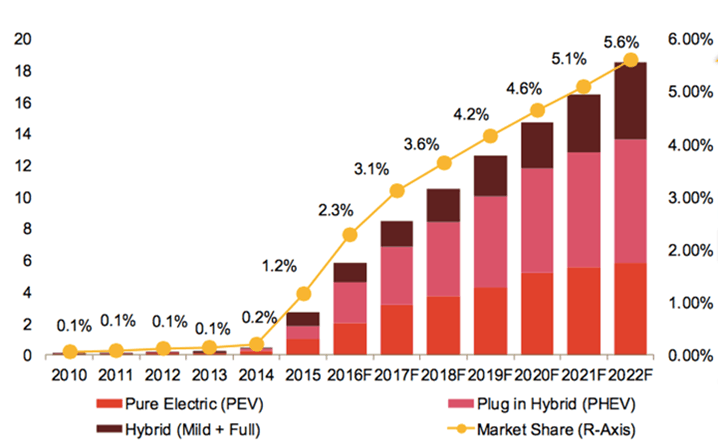The Chinese Automotive Market: Challenges And Opportunities For Premium Brands

Table of Contents
Understanding the Chinese Consumer Preferences for Premium Vehicles
The Chinese automotive market is driven by a sophisticated and discerning consumer base. Understanding their preferences is paramount for premium brands aiming to thrive.
Shifting Consumer Demographics and Buying Habits
- Rising Middle Class: China's burgeoning middle class fuels the demand for luxury goods, including premium vehicles. Their increased disposable income directly translates into higher spending on automobiles.
- Increased Disposable Income: This translates into a higher willingness to spend on luxury features and advanced technologies, driving demand for premium vehicles.
- Demand for Luxury Features: Advanced driver-assistance systems (ADAS), sophisticated infotainment systems, and high-quality interior materials are highly sought after.
- Preference for Technological Advancements: Chinese consumers are early adopters of technology, expecting cutting-edge features in their premium vehicles. Electric vehicles (EVs) and hybrid electric vehicles (HEVs) are gaining significant traction.
- Emphasis on Brand Prestige and Social Status: Owning a premium vehicle is often viewed as a symbol of success and social standing, impacting brand choice significantly.
The changing demographics significantly influence purchasing decisions. For instance, younger generations are more tech-savvy and prioritize innovative features, while older generations may focus more on brand reputation and comfort. Features like panoramic sunroofs, advanced air purification systems, and personalized infotainment options are particularly popular amongst Chinese premium car buyers.
Brand Perception and Marketing Strategies
Effective marketing is crucial for premium brands in China.
- Importance of Localized Marketing Campaigns: Generic global campaigns rarely resonate. Tailoring marketing efforts to reflect Chinese culture and values is essential.
- Adapting Messaging to Resonate with Chinese Culture: Understanding cultural nuances and sensitivities is critical for crafting effective messaging that builds trust.
- Building Trust and Brand Loyalty: Establishing a strong reputation for quality, reliability, and customer service is paramount in a market where trust is highly valued.
- Utilizing Digital Marketing Effectively: China's robust digital landscape requires a strong online presence, leveraging social media platforms like WeChat and Weibo for effective marketing.
Successful campaigns often incorporate celebrity endorsements, emphasize technological advancements, and showcase the status and prestige associated with the brand. Failing to adapt to the cultural context can lead to misinterpretations and hinder brand acceptance.
Navigating the Regulatory Landscape in the Chinese Automotive Market
The Chinese automotive market is heavily regulated, posing both challenges and opportunities for premium brands.
Government Regulations and Policies
- Emission Standards: Stringent emission regulations are driving the adoption of electric and hybrid vehicles, impacting the market for traditional internal combustion engine (ICE) vehicles.
- Safety Regulations: Rigorous safety standards require premium brands to meet specific safety requirements for their vehicles sold in China.
- Import Tariffs: High import tariffs on foreign vehicles can significantly increase the cost of premium vehicles, affecting pricing strategies.
- Electric Vehicle (EV) Mandates: Government mandates promote the adoption of EVs, creating opportunities for premium brands offering electric models.
- Localization Requirements: Regulations often require foreign manufacturers to establish local production facilities or partner with Chinese companies.
- Government Incentives for Domestic Brands: Government support for domestic brands can create challenges for foreign competitors.
Understanding and adapting to these regulations is crucial for navigating the market successfully. For example, brands are increasingly investing in local production to reduce costs and comply with localization requirements.
The Role of Joint Ventures and Local Partnerships
Joint ventures and partnerships are common strategies in the Chinese automotive market.
- Advantages of Joint Ventures: Joint ventures provide access to local expertise, distribution networks, and government support. They can help navigate the complex regulatory landscape.
- Challenges Associated with Partnerships: Challenges include managing cultural differences, negotiating intellectual property rights, and sharing profits.
- Navigating Cultural Differences: Effective communication and collaboration require a deep understanding of Chinese business practices and cultural norms.
- Managing Intellectual Property Rights: Protecting intellectual property is critical, requiring robust legal agreements and safeguards.
Successful joint ventures leverage the strengths of both partners, creating synergies that lead to market success. However, careful planning and effective management are essential to mitigate potential risks.
Competing in a Highly Competitive Market
The Chinese automotive market is fiercely competitive, demanding strategic acumen and innovation.
Intense Competition from Domestic and International Brands
- Growing Strength of Domestic Chinese Brands: Domestic brands are rapidly improving in terms of quality, technology, and design, posing a growing threat to international competitors.
- Aggressive Pricing Strategies: Intense competition leads to aggressive pricing strategies, demanding careful cost management and pricing optimization from premium brands.
- Fierce Rivalry among Established International Players: Established international players are battling for market share, resulting in intense competition and price wars.
- The Rise of New Energy Vehicles (NEVs): The rapid growth of the NEV segment presents both opportunities and challenges, demanding substantial investments in R&D and manufacturing.
Understanding the strengths and weaknesses of competitors is vital for effective market positioning and competitive advantage.
Pricing Strategies and Market Positioning
Effective pricing strategies are crucial for success in the Chinese market.
- Balancing Price Competitiveness with Brand Prestige: Premium brands must strike a balance between maintaining their premium image and offering competitive prices.
- Adapting Pricing to Different Market Segments: Targeting different market segments requires adjusting pricing strategies to appeal to specific consumer groups.
- Developing Unique Value Propositions: Offering unique features, superior quality, or exceptional customer service can help premium brands differentiate themselves and justify higher prices.
A well-defined pricing strategy that considers the competitive landscape, consumer preferences, and brand positioning is crucial for profitability.
Conclusion
The Chinese automotive market offers enormous opportunities for premium brands but presents considerable challenges. Success hinges on a thorough understanding of Chinese consumer preferences, navigating the complex regulatory landscape, and effectively competing in a highly competitive environment. By adapting their strategies, embracing localization, investing in innovative technologies, particularly in the burgeoning NEV segment, and fostering strong relationships with local partners, premium brands can unlock the vast potential of this dynamic and lucrative market.
Call to Action: Are you a premium automotive brand looking to conquer the Chinese market? Contact us today to learn more about navigating the challenges and capitalizing on the opportunities in the thriving Chinese automotive market. Let us help you develop a winning strategy for success in this lucrative market.

Featured Posts
-
 The Life And Times Of Samuel Dickson A Canadian Industrialist
May 10, 2025
The Life And Times Of Samuel Dickson A Canadian Industrialist
May 10, 2025 -
 A Candid Conversation Judge Jeanine Pirro On Life Fears And Love At Fox News
May 10, 2025
A Candid Conversation Judge Jeanine Pirro On Life Fears And Love At Fox News
May 10, 2025 -
 Uk Visa Crackdown Increased Scrutiny For Nigerian And Other Nationals
May 10, 2025
Uk Visa Crackdown Increased Scrutiny For Nigerian And Other Nationals
May 10, 2025 -
 Fentanyl Crisis And Us China Trade Exploring The Unexpected Connection
May 10, 2025
Fentanyl Crisis And Us China Trade Exploring The Unexpected Connection
May 10, 2025 -
 Harry Styles Responds To A Bad Snl Impression
May 10, 2025
Harry Styles Responds To A Bad Snl Impression
May 10, 2025
